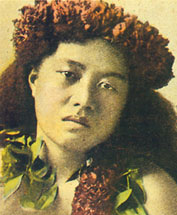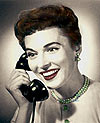Jacket 12 — October 2000 — Contents page
Paul Blackburn, Jorge Carerra Andrade, Kenneth Patchen
Paul Blackburn
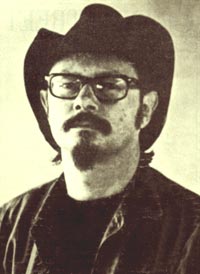
Photo of Paul Blackburn
courtesy Joan Miller-Cohn
 Paul Blackburn — poem — Statement (1954)
Paul Blackburn — poem — Statement (1954)
 Robert Creeley — Preface to Against the Silences
Robert Creeley — Preface to Against the Silences
 Mark Weiss — "Zefiro Torna" — for Paul Blackburn — and an afterword
Mark Weiss — "Zefiro Torna" — for Paul Blackburn — and an afterword
 Laurie Duggan — "Mister P.B." — on Paul Blackburn
Laurie Duggan — "Mister P.B." — on Paul Blackburn
 Allen Brafman — Paul Blackburn — A Few Words
Allen Brafman — Paul Blackburn — A Few Words
 Michael Heller — For Paul Blackburn
Michael Heller — For Paul Blackburn
 Bob Holman — Just A Moment: Paul Blackburn and the Fragmentation of the New American Poetry
Bob Holman — Just A Moment: Paul Blackburn and the Fragmentation of the New American Poetry
 Martha King — Reading Paul Blackburn
Martha King — Reading Paul Blackburn
 Basil King — painting of Joan and Paul Blackburn
Basil King — painting of Joan and Paul Blackburn
 Jackson Mac Low — three poems for Paul Blackburn
Jackson Mac Low — three poems for Paul Blackburn
 Jerome Rothenberg — a note on Paul Blackburn
Jerome Rothenberg — a note on Paul Blackburn
 Jerome Rothenberg — four poems
Jerome Rothenberg — four poems
 Armand Schwerner — poem — letter to Paul Blackburn . . .
Armand Schwerner — poem — letter to Paul Blackburn . . .
 Carl Thayler — Remembering Paul Blackburn
Carl Thayler — Remembering Paul Blackburn
Reviews and Articles
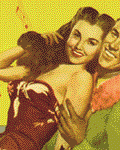
Esther Williams — Pagan Love Song poster
 Poetry Criticism: What Is It For? (March 15th, 2000, New York City) — moderated by poet Susan Wheeler, the panel engaged critics Stephen Burt, Marjorie Perloff, Michael Scharf and Helen Vendler in a provocative discussion of poetry criticism today. Burt’s and Scharf’s papers were published in Jacket 11; the others are published here, with some audience discussion.
Poetry Criticism: What Is It For? (March 15th, 2000, New York City) — moderated by poet Susan Wheeler, the panel engaged critics Stephen Burt, Marjorie Perloff, Michael Scharf and Helen Vendler in a provocative discussion of poetry criticism today. Burt’s and Scharf’s papers were published in Jacket 11; the others are published here, with some audience discussion.
 Paul Quinn on Language poetry — " . . .puns and jokes . . . appropriate for a poet who . . . boasts of working under the influence of the three Marxes — Chico, Groucho and Karl — and the four Williamses — Raymond, William Carlos, Tennessee and Esther."
Paul Quinn on Language poetry — " . . .puns and jokes . . . appropriate for a poet who . . . boasts of working under the influence of the three Marxes — Chico, Groucho and Karl — and the four Williamses — Raymond, William Carlos, Tennessee and Esther."
 David Hess — No Surprises: On Barrett Watten (50 pages)
David Hess — No Surprises: On Barrett Watten (50 pages)
 Kristin Prevallet — The Exquisite Extremes of Poetry (Watten and Baraka)
Kristin Prevallet — The Exquisite Extremes of Poetry (Watten and Baraka)
 Nate Dorward on three books about Roy Fisher — Interviews through Time and Selected Prose, Roy Fisher. News for the Ear: A Homage to Roy Fisher. Ed. Peter Robinson and Robert Sheppard, and The Thing about Roy Fisher: Critical Studies Ed. John Kerrigan and Peter Robinson.
Nate Dorward on three books about Roy Fisher — Interviews through Time and Selected Prose, Roy Fisher. News for the Ear: A Homage to Roy Fisher. Ed. Peter Robinson and Robert Sheppard, and The Thing about Roy Fisher: Critical Studies Ed. John Kerrigan and Peter Robinson.
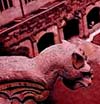
 Cassandra Pybus — The CIA as Culture Vultures — on the funding of Quadrant magazine — "Josselson was not happy with the make-up of the Australian committee since the CIA strategy was to court intellectuals of the non-communist left, not fund a bunch of zealous anti-communists. . . . Krygier chose James McAuley as editor. He was not an obvious choice for editor of a literary journal, since he was viewed by many in the literary world as a mediocre poet and a Catholic fanatic. This chorus of concern did not bother Krygier. He had no interest in poetry or religion: it was McAuley’s passionate anti-communism which really impressed him."
Cassandra Pybus — The CIA as Culture Vultures — on the funding of Quadrant magazine — "Josselson was not happy with the make-up of the Australian committee since the CIA strategy was to court intellectuals of the non-communist left, not fund a bunch of zealous anti-communists. . . . Krygier chose James McAuley as editor. He was not an obvious choice for editor of a literary journal, since he was viewed by many in the literary world as a mediocre poet and a Catholic fanatic. This chorus of concern did not bother Krygier. He had no interest in poetry or religion: it was McAuley’s passionate anti-communism which really impressed him."
 Robert Creeley on Charles Olson (his Preface to Charles Olson: The Allegory of a Poet’s Life, by Tom Clark)
Robert Creeley on Charles Olson (his Preface to Charles Olson: The Allegory of a Poet’s Life, by Tom Clark)
 John Miles — Lost Angry Penguins: D.B. Kerr, P.G. Pfeiffer and the real founding of the Angry Penguins
John Miles — Lost Angry Penguins: D.B. Kerr, P.G. Pfeiffer and the real founding of the Angry Penguins
 Sister Sites — Rebecca Wolff — The Story of Fence
Sister Sites — Rebecca Wolff — The Story of Fence
 Drew Milne on Caroline Bergvall
Drew Milne on Caroline Bergvall
 Caroline Bergvall — excerpt from Goan Atom
Caroline Bergvall — excerpt from Goan Atom
 Tony Baker on Basil Bunting
Tony Baker on Basil Bunting
 Stephen Cope on A Wild Salience: The Writing of Rae Armantrout
Stephen Cope on A Wild Salience: The Writing of Rae Armantrout
 Rae Armantrout — four poems
Rae Armantrout — four poems
 Tom Clark reviews Rachel Loden’s Hotel Imperium
Tom Clark reviews Rachel Loden’s Hotel Imperium
 Rachel Loden — eight poems from Hotel Imperium
Rachel Loden — eight poems from Hotel Imperium
 Ramez Qureshi reviews A Paradise of Poets, by Jerome Rothenberg
Ramez Qureshi reviews A Paradise of Poets, by Jerome Rothenberg
 Dale Smith reviews Tom Clark’s The Spell
Dale Smith reviews Tom Clark’s The Spell
 David Kennedy reviews Martin Corless-Smith’s Complete Travels
David Kennedy reviews Martin Corless-Smith’s Complete Travels
 Jack Kimball — Mad in Craft: Hannah Weiner and Alan Sondheim
Jack Kimball — Mad in Craft: Hannah Weiner and Alan Sondheim
 Charles Bernstein on Hannah Weiner
Charles Bernstein on Hannah Weiner
Feature — Jorge Carerra Andrade
edited by Steven Ford Brown
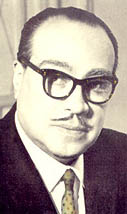
Photograph of Jorge Carerra Andrade
courtesy Enrique Qjeda, Boston College
 Introduction, by Steven Ford Brown
Introduction, by Steven Ford Brown
 Twelve Poems — translated by Steven Ford Brown
Twelve Poems — translated by Steven Ford Brown
 H.R.Hays — Jorge Carrera Andrade: "Magician of Metaphors" (1943)
H.R.Hays — Jorge Carrera Andrade: "Magician of Metaphors" (1943)
 John Peale Bishop on Andrade (1946)
John Peale Bishop on Andrade (1946)
 Other voices on Andrade — Julian Palley, J. Enrique Qjeda
Other voices on Andrade — Julian Palley, J. Enrique Qjeda
 Jorge Carrera Andrade — ‘The New American and His Point of View toward Poetry’ — trans. by H.R. Hays
Jorge Carrera Andrade — ‘The New American and His Point of View toward Poetry’ — trans. by H.R. Hays
 Jorge Carrera Andrade — a lecture, Vassar College, 1970
Jorge Carrera Andrade — a lecture, Vassar College, 1970
 Biographical Sketch and Chronology
Biographical Sketch and Chronology
 Steven Ford Brown — A Partial Bibliography
Steven Ford Brown — A Partial Bibliography
 an interview with Steven Ford Brown, in Jacket 18.
an interview with Steven Ford Brown, in Jacket 18.
Larry Smith — Kenneth Patchen
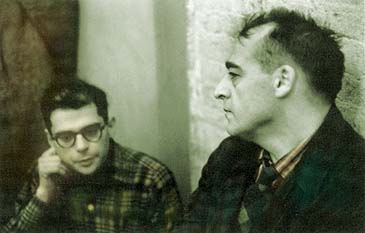
Allen Ginsberg and Kenneth Patchen backstage at the Living Theatre where Patchen was performing with Charlie Mingus, New York City 1959. Photo copyright © Harry Redl 1959, 2000.
 Poetry and Jazz days, 1957–1959
Poetry and Jazz days, 1957–1959
From the book Kenneth Patchen: Rebel Poet in America
by Larry Smith
Pacific Time
 Rob Wilson: From the Sublime to the Devious: Writing the Experimental/ Local Pacific:
Rob Wilson: From the Sublime to the Devious: Writing the Experimental/ Local Pacific:
— ‘Two Postmodernisms’
— Hawai’i: Becoming Miss Universe?
— More Panic Poetics, As Such
 Joe Amato — a response to Rob Wilson
Joe Amato — a response to Rob Wilson
Poems et cetera
The death of Montparnasse…
You think computers ruined poetry — wait till you see what artistic and social ruin the telephone caused:
‘After a day of work, the artists wanted to get away from their studios, and get away from what they were creating. They all met in the cafés to argue about this and that, to discuss their work, politics and philosophy.... We went to the bar of La Coupole. Bob, the barman, was a terrible nice chap... As there was no telephone in those days everybody used him to leave messages. At the Dôme we also had a little place behind the door for messages. The telephone was the death of Montparnasse.
’
— Jaqueline Goddard, January 1995.
Jacqueline Goddard (b.1911) an icon of bohemian femininity, was part of the Paris artistic scene between the wars, and was photographed by Man Ray in Paris in 1930. The telephone lady above is not Ms Goddard.
— Borrowed (with permission) from the Dead Media Project website, at
http://www.deadmedia.org/modest-proposal.html, editor Bruce Sterling

This material is copyright © Jacket magazine 2006
You are at this page:
Jacket 12 — October 2000
The URL address of this page is
http://jacketmagazine.com/12/index.shtml
|
Jacket [»»] Homepage
Jacket’s homepage has received over half a million visits since 1997. All issues are available here, featuring thousands of pages of poetry, creative prose, reviews, interviews, author photos, and informative articles. Address:
Jacket magazine
c/- Australian Literary Management
2-A Booth Street
Balmain NSW 2041
A U S T R A L I A
» Electronic mail
ISSN 1440-4737
The word Jacket is the registered business name of this magazine (registration number U2708004) under the Business Names Act of 1962, New South Wales Consumer Protection Agency, NSW Department of Fair Trading. The word Jacket is a registered trademark number 886295 in the Register of Trade Marks, Commonwealth of Australia.

Jacket is sponsored by Australian Literary Management.
ALM was founded in 1980 in Melbourne, Australia, and is now based in Balmain, a harbourside suburb ten minutes from the centre of Sydney. ALM looks after the business affairs of more than a hundred authors around the world, negotiating their contracts and managing their careers. You can visit ALM’s » Internet site.
All issues of Jacket magazine are archived in perpetuity by » Pandora, Australia’s free Internet Archive at the National Library of Australia.
Plaudits: In January 2000 Jacket was selected for an ‘Encyclopaedia Britannica Internet Guide Award’. Jacket has been chosen as a ‘recommended site’ on a number of international web sites — see our » About Jacket Page.
Note from the Editor: I cannot accept poetry contributions that I don’t specifically ask for — I don’t have the time or the space to handle them yet. If you’d like to submit a review, article or interview, send a half-page synopsis with your return email address. Because Jacket is free and has no advertising and no source of income, I regret that I cannot offer to pay for contributions.
Copyright Notice: Please respect the fact that this material is copyright. It is made available here without charge for personal use only. It may not be stored, displayed, published, reproduced, or used for any other purpose. The material in this issue of Jacket is copyright © the individual contributors and Jacket magazine, as at the date of this issue.
|






